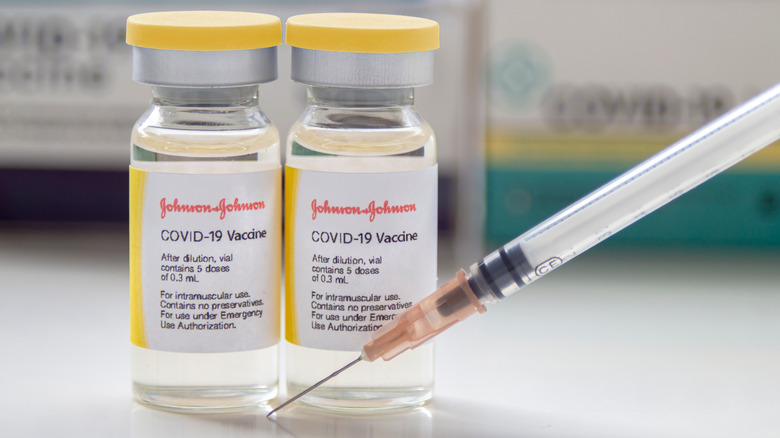The Truth About The FDA's New Warning For The Johnson & Johnson COVID-19 Vaccine
As the COVID-19 pandemic rages on and vaccines continue to get distributed, an increasing amount of research is being done on the virus' lasting effects and the vaccines' effects on the human body. For example, scientists are currently looking at current vaccines' effectiveness in fighting the delta variant, as well as how long the vaccines will last.
COVID-19 vaccines are unique because of the way they inform the body about the virus. Unlike other vaccines, they don't actually contain any of the virus they're intended to fight, meaning that no COVID-19 strains are introduced to your body when you get the vaccine. In the United States, there are three main COVID-19 vaccines: the Pfizer, Moderna, and Johnson & Johnson vaccines (via the Centers for Disease Control). However, AstraZeneca and Novavax are working toward becoming top vaccine producers and distributors, too.
COVID-19 vaccines can come with a number of side effects, but they're nothing too horrible. According to the Mayo Clinic, you may experience swollen lymph nodes, fever, fatigue, joint and/or muscle pain, nausea and vomiting, chills, headaches, and pain or swelling at the injection site, but these are all minor in comparison to the coronavirus' effects on the body. But there is now a new warning that is specific to the Johnson & Johnson vaccine, issued by the United States Food and Drug Administration.
This Johnson & Johnson vaccine side effect can last weeks or several years
While most of the COVID-19 vaccine side effects are rather minor, the Johnson & Johnson vaccine now comes with a new warning. According to The New York Times, the United States Food and Drug Administration (FDA) has announced that the Johnson & Johnson vaccine may cause a "rare nerve syndrome." This syndrome, Guillain-Barré syndrome, has been identified in an estimated 100 people who received the one-dose vaccine. Because this number is low — an estimated 12.8 million Americans have received the Johnson & Johnson vaccine — and the vaccine is potentially life-saving, officials still recommend getting the jab.
In an official statement, government officials said that accessible information "suggests an association" between the vaccine and syndrome, but that, "It is insufficient to establish a causal relationship."
While the link between the syndrome and the vaccine may not be concrete, it's important to know just what Guillain-Barré syndrome is. According to the Centers for Disease Control, Guillain-Barré syndrome is an autoimmune disorder that causes your immune system to attack your nerves. Its symptoms can last anywhere from a few weeks to a few years. "Most people recover fully, but some have permanent nerve damage. Some people have died of GBS," the CDC warns. This syndrome can also lead to paralysis, as your muscles continue to be attacked by your immune system.
Still, with only 100 cases out of 12.8 million Johnson & Johnson vaccinations, officials urge you to get vaccinated if you can.

